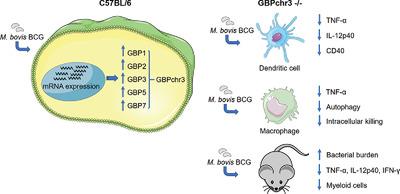当前位置:
X-MOL 学术
›
J. Leukoc. Biol.
›
论文详情
Our official English website, www.x-mol.net, welcomes your
feedback! (Note: you will need to create a separate account there.)
Guanylate binding proteins contained in the murine chromosome 3 are important to control mycobacterial infection.
Journal of Leukocyte Biology ( IF 3.6 ) Pub Date : 2020-07-03 , DOI: 10.1002/jlb.4ma0620-526rr Fabio V Marinho 1 , Julia S Fahel 1 , Ana Carolina V S C de Araujo 1 , Lunna T S Diniz 1 , Marco T R Gomes 1 , Danilo P Resende 2 , Ana P Junqueira-Kipnis 2 , Sergio C Oliveira 1
Journal of Leukocyte Biology ( IF 3.6 ) Pub Date : 2020-07-03 , DOI: 10.1002/jlb.4ma0620-526rr Fabio V Marinho 1 , Julia S Fahel 1 , Ana Carolina V S C de Araujo 1 , Lunna T S Diniz 1 , Marco T R Gomes 1 , Danilo P Resende 2 , Ana P Junqueira-Kipnis 2 , Sergio C Oliveira 1
Affiliation

|
Guanylate binding proteins (GBPs) are important effector molecules of autonomous response induced by proinflammatory stimuli, mainly IFNs. The murine GBPs clustered in chromosome 3 (GBPchr3) contains the majority of human homologous GBPs. Despite intense efforts, mycobacterial‐promoted diseases are still a major public health problem. However, the combined importance of GBPchr3 during mycobacterial infection has been overlooked. This study addresses the influence of the GBPchr3 in host immunity against mycobacterial infection to elucidate the relationship between cell‐intrinsic immunity and triggering of an efficient anti‐mycobacterial immune response. Here we show that all GBPchr3 are up‐regulated in lungs of mice during Mycobacterium bovis BCG infection, resembling tissue expression of IFN‐γ. Mice deficient in GBPchr3 (GBPchr3−/−) were more susceptible to infection, displaying diminished expression of autophagy‐related genes (LC3B, ULK1, and ATG5) in lungs. Additionally, there was reduced proinflammatory cytokine production complementary to diminished numbers of myeloid cells in spleens of GBPchr3−/−. Higher bacterial burden in GBPchr3−/− animals correlated with increased number of tissue granulomas. Furthermore, absence of GBPchr3 hampered activation and production of TNF‐α and IL‐12 by dendritic cells. Concerning macrophages, lack of GBPs impaired their antimicrobial function, diminishing autophagy induction and intracellular killing efficiency. In contrast, single GBP2 deficiency did not contribute to in vivo bacterial control. In conclusion, this study shows that GBPchr3 are important not only to stimulate cell‐intrinsic immunity but also for inducing an efficient immune response to control mycobacterial infection in vivo.
中文翻译:

鼠染色体3中包含的鸟苷酸结合蛋白对于控制分枝杆菌感染很重要。
鸟苷酸结合蛋白(GBPs)是由促炎刺激(主要是IFN)诱导的自主反应的重要效应分子。聚集在3号染色体上的鼠GBPs(GBPchr3)包含大多数人类同源GBPs。尽管付出了巨大的努力,但分枝杆菌引起的疾病仍然是主要的公共卫生问题。但是,GBPchr3在分枝杆菌感染中的综合重要性已被忽略。这项研究探讨了GBPchr3在宿主抵抗分枝杆菌感染的免疫中的影响,以阐明细胞内在免疫与触发有效抗分枝杆菌免疫反应之间的关系。在这里,我们显示牛分枝杆菌期间,所有GBPchr3在小鼠肺中均上调BCG感染,类似于IFN-γ的组织表达。缺乏GBPchr3(GBPchr3 -/-)的小鼠更容易感染,表现出自噬相关基因(LC3B,ULK1和ATG5)在肺中的表达减少。另外,与GBpchr3 -/-脾脏中髓样细胞数量减少相辅相成的促炎细胞因子产生减少。GBPchr3中较高的细菌负担-/-动物与组织肉芽肿数目增加有关。此外,GBPchr3的缺乏会阻碍树突状细胞的激活以及TNF-α和IL-12的产生。关于巨噬细胞,缺乏GBPs会削弱其抗菌功能,降低自噬诱导作用和细胞内杀伤效率。相反,单一的GBP2缺乏并不能促进体内细菌的控制。总之,这项研究表明GBPchr3不仅在刺激细胞内在免疫方面很重要,而且在诱导有效的免疫应答以控制体内分枝杆菌感染方面也很重要。
更新日期:2020-07-03
中文翻译:

鼠染色体3中包含的鸟苷酸结合蛋白对于控制分枝杆菌感染很重要。
鸟苷酸结合蛋白(GBPs)是由促炎刺激(主要是IFN)诱导的自主反应的重要效应分子。聚集在3号染色体上的鼠GBPs(GBPchr3)包含大多数人类同源GBPs。尽管付出了巨大的努力,但分枝杆菌引起的疾病仍然是主要的公共卫生问题。但是,GBPchr3在分枝杆菌感染中的综合重要性已被忽略。这项研究探讨了GBPchr3在宿主抵抗分枝杆菌感染的免疫中的影响,以阐明细胞内在免疫与触发有效抗分枝杆菌免疫反应之间的关系。在这里,我们显示牛分枝杆菌期间,所有GBPchr3在小鼠肺中均上调BCG感染,类似于IFN-γ的组织表达。缺乏GBPchr3(GBPchr3 -/-)的小鼠更容易感染,表现出自噬相关基因(LC3B,ULK1和ATG5)在肺中的表达减少。另外,与GBpchr3 -/-脾脏中髓样细胞数量减少相辅相成的促炎细胞因子产生减少。GBPchr3中较高的细菌负担-/-动物与组织肉芽肿数目增加有关。此外,GBPchr3的缺乏会阻碍树突状细胞的激活以及TNF-α和IL-12的产生。关于巨噬细胞,缺乏GBPs会削弱其抗菌功能,降低自噬诱导作用和细胞内杀伤效率。相反,单一的GBP2缺乏并不能促进体内细菌的控制。总之,这项研究表明GBPchr3不仅在刺激细胞内在免疫方面很重要,而且在诱导有效的免疫应答以控制体内分枝杆菌感染方面也很重要。











































 京公网安备 11010802027423号
京公网安备 11010802027423号